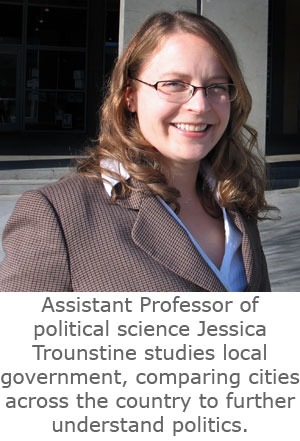

All politics is local, and for UC Merced Professor
Jessica Trounstine, it’s the most fruitful level to study.
City and county governments are where she digs to find answers to larger political questions, such as why incumbents win reelection and what factors affect community investment.
“There are a lot of holes in our understanding of how the local process works,” she said.
Trounstine, a
political scienceprofessor, joined the university last year after spending five years at Princeton University as an assistant professor.
“My plan was always to be back in California,” said Trounstine, a San Jose native. “The question was “When?’ and “Where?’”
Trounstine was encouraged by political science Professor
Nathan W. Monroeto consider applying for an open position in the
School of Social Sciences, Humanities and Arts. She knew little of the campus, only that it was in the works when she was working for Gov. Gray Davis.
During the job interview, she had fascinating conversations with every faculty member she met and learned that she shared research interests with many of them. She called it the “perfect intellectual synergy.”
“The quality of faculty blew me away,” she said. “My fit (here) was overwhelming.”
Monroe and Trounstine finished their graduate work UC San Diego together in 2004 and kept in touch when they began their first jobs. Monroe thought she’d be a good fit because of her high-level of research into local government.
“She’s a leading scholar in her field, but she also cares about teaching,” he said. “We all feel fortunate to have her here.”
Trounstine said the faculty was enthusiastic and supportive about her research, which touches on other disciplines, such as economics and sociology.
One forthcoming paper she co-authored shows diverse cities send fewer bond measures to voters and generally spend less on public projects. The leaders; however, make sure they build strong coalitions to ensure passage.
Trounstine has also published a book, “Political Monopolies in American Cities: The Rise and Fall of Bosses and Reformers,” that compares Richard J. Daley’s political machine in Chicago with Anthony “Dutch” Hamman’s reform government in San Jose. She finds that machine and reform governments share more than people previously thought.
At UC Merced, Trounstine looks forward to building the political science department with her colleagues.
“It feels like there is limitless potential,” she said.
Trounstine’s research focuses on comparing and contrasting large numbers of cities and using detailed case studies to learn how local politics operates. Among other things, she is interested in studying coalitions on city councils, understanding how partisanship plays a role in local elections and exploring the factors that lead communities to invest in new services and infrastructure.
Very little research has been conducted on the politics of California’s Central Valley. She hopes to change that in the coming months and years.






